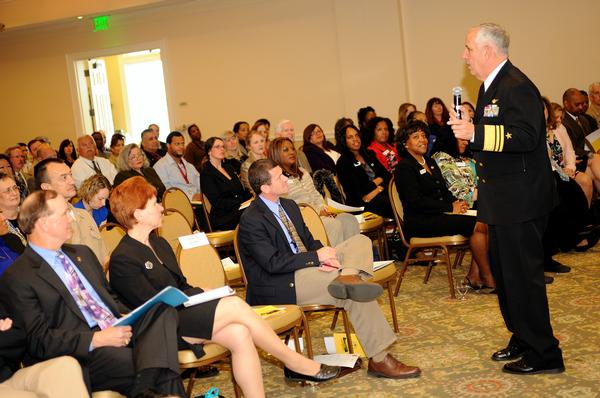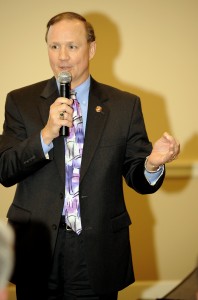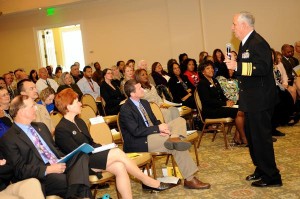Astronaut Advises NAVAIR Staff to Find Mentors


Retired U.S. Navy Capt. Pierre Thuot, a former astronaut, said mentors helped him reach his childhood dream of flying in space.
Flying in his first space mission in 1990, astronaut Pierre Thuot needed some guidance.
Then-mission specialist Thuot turned to the lead payload specialist on the Atlantis for mentoring and guidance during the flight. The result? Thuot went on to fly in two more space shuttle missions and logged more than 654 hours in space, including 17.7 hours on three space walks.
Thuot was one of four Navy leaders who spoke at the “Navigating NAVAIR “¦ and Beyond” mentoring event held at the River’s Edge Conference Center at Naval Air Station Patuxent River April 4. Sponsored by NAVAIR’s National Mentoring Team and the Federally Employed Women Patuxent River Chapter, the event was also broadcast via video teleconference to eight NAVAIR sites.
Mentoring is a developmental relationship that pairs an experienced person (mentor) with a less experienced person (mentee/protege). By sharing their knowledge, advice and experiences, mentors offer mentees/proteges insight and guidance to do their jobs more effectively or to progress in their career, said Garry Newton, deputy assistant commander for logistics and industrial operations and the event moderator.
Mentoring can sharpen management, leadership and interpersonal skills, expand professional networks and help with career planning. According to a 2002 study published in Academy of Management Journal, mentees/proteges also experience higher positive job attitudes and career satisfaction, commitment and mobility.
NAVAIR’s mentoring program includes a mentoring toolkit, handbook, training and an online mentoring tool, iMentor, to match mentors with mentees/proteges.
“Think of a mentor as an adviser,” said Mentorship Program Manager Donna Belcher. “We advise family, friends and co-workers all the time it’s usually painless. Mentees/proteges are learners, and we can all benefit from learning whether it’s to enhance our careers, reach a goal, solve a problem or just be more in touch with our environment. You can definitely benefit by being or having a mentor.”

NAVAIR Commander Vice Adm. David Architzel said mentoring relationships may begin when a senior level employee takes an interest in someone junior and that mentoring relationships evolve over years some even lasting lifetimes.
Toni Meier, director of the Logistics Management Integration Department, started her career in 1973 as a GS-1 shipment clerk at Wright-Patterson Air Force Base and now serves as NAVAIR’s most recent Senior Executive Service member. She credits her mentor, her motivation to finish her college classes at night, and formal development programs as being instrumental to her success.
Thuot, too, said his mentoring relationships helped him fulfill his lifelong dream of becoming an astronaut. His first mentor, an eighth grade teacher, took an interest in him and helped set him on the path of choosing the right friends.
Later, he paid it forward while working as an instructor at the U.S. Naval Test Pilot School, mentoring a student struggling with his report writing. At the end of the year, under Thuot’s tutorage, the student improved enough to win an award for his report.
Finding and working with a mentor
The first step is finding a mentor, something that can begin on the first day of your career. Meier recommends having at least two mentors one within your area of expertise and one outside it and to ask your supervisor to help you find one.
Newton also recommends looking for mentors outside your organization. One way to do that is to become involved in civic and community groups.
Once in the mentoring relationship, you should learn everything you can from your mentors, such as how they handled themselves in adverse situations and any mistakes they made.
Being mentored, or serving as a mentor, takes time.
In addition to mentoring and building your network, the speakers listed being proactive, being open to challenges and willing to learn as crucial to career success.
Source: NAVAIR Headquarters























